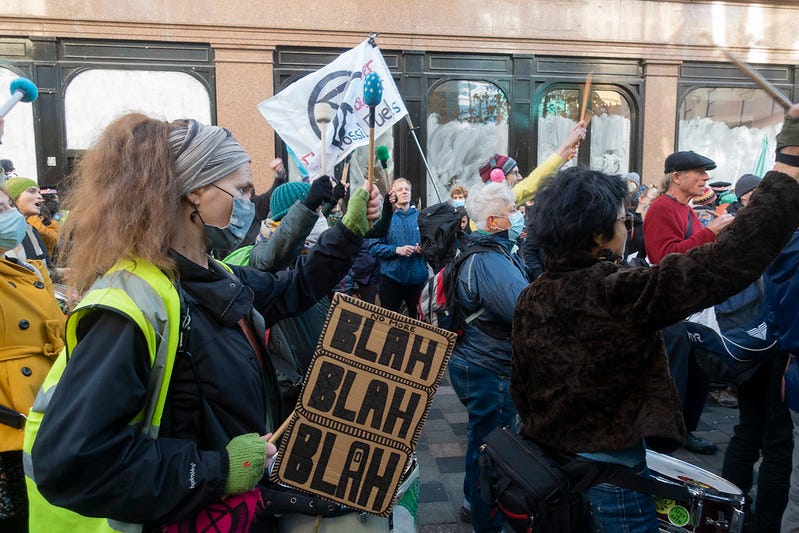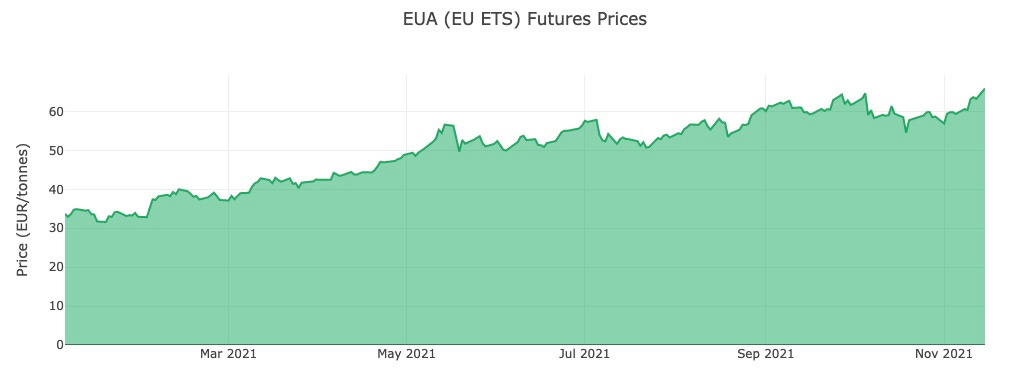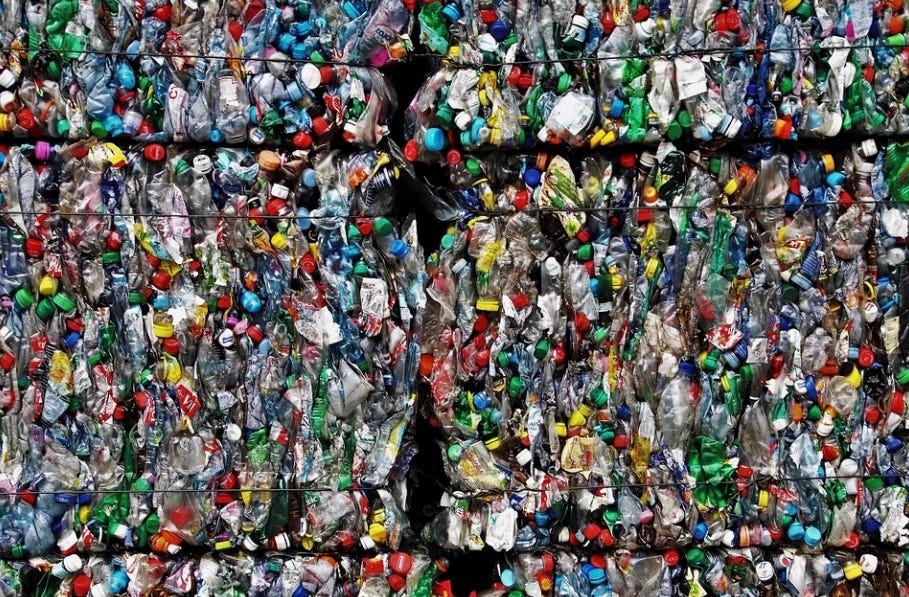Coal stocks, carbon prices tell the COP26 story; plus, the G20 needs an emergency meeting
Welcome to Callaway Climate Insights. Only 12 months to COP27 in Egypt.
Callaway Climate Insights publishes Tuesdays and Thursdays for everybody. To get our insights and analysis every day, please subscribe.
Tracking the European Union and United Kingdom Emissions Trading System carbon market price day-by-day. One EUA or UKA gives the holder the right to emit one tonne of carbon dioxide, or the equivalent amount of two more powerful greenhouse gases, nitrous oxide and perfluorocarbons.
Everyone has their opinion of how much China and India’s 11th-hour sabotage of the COP26 conference communique set back coal reduction efforts in Glasgow over the weekend, but for those voting with their money, coal stocks tell the story.
Despite international cries that changing the wording from “phase out” coal to “phase down” turned success to failure at the United Nations summit, investors sold coal stocks around the world this week. The reason is that beneath the geopolitical drama, investors understand that coal’s days are still numbered.
Coal stocks fell in Asia and Europe, according to Reuters, while in the U.S. shares such as Peabody Energy (BTU) and Arch Resources (ARCH) got whacked on Monday, and were trending at lower levels Tuesday. A close look at the year-to-date charts of both shares show how they’ve climbed this year amid Sen. Joe Manchin’s (D-W.Va.) defense of coal in the U.S. Senate, but they began to give back gains as COP26 started.
Over on the carbon markets, prices in Europe hit a new high this week of €65.93 ($74.66) in reaction to progress made in Glasgow to create an international carbon market for emissions trading and offsets. Prices have more than doubled since the beginning of the year.
As President Joe Biden’s new infrastructure bill provides new opportunity for electric vehicle shares, as well as big builders and construction stocks, it becomes clear that to investors at least, the transition is still moving in the right direction.
More insights below. . . .
Don’t forget to contact me directly if you have suggestions or ideas at dcallaway@callawayclimateinsights.com.
After Glasgow failure, G20 must convene an emergency session

. . . . Environmental adviser and author Rick Steiner, founder of Oasis Earth in Anchorage, Alaska, goes beyond merely criticizing COP26 for failing in its mission and is demanding an emergency meeting of the G20 nations early next year. In a guest column for Callaway Climate Insights, Steiner said only a legally binding deal among the wealthiest nations, like was done with 1987 Montreal Protocol on ozone protection, can move the needle on carbon reduction. And Steiner goes a step further and argues for a boycott of the Winter Olympics in Beijing in three months to protest China’s refusal to back down on its surge in coal production. While there are many reasons for Western nations to potentially boycott the Beijing games, this was first argument we’ve heard about climate. Probably not the last. . . .
Tuesday’s subscriber insights: Wanted! Recycling billionaires
. . . . Ever notice why we never read about recycling billionaires? That’s because there are none, or if there are, they’re keeping a low profile. The business of recycling is in crisis, and causing people to give up on their efforts. But the new infrastructure bill signed by the president yesterday contains a new strategy, and provides $275 million in grant financing for recycling business ideas. Read more here. . . .
. . . . What happens when the PR firm has the public relations crisis? That’s the issue at global giant Edelman, which has represented ExxonMobil (XOM) for years, and is being pressured by environmental activists to drop them. Richard Edelman is know shrinking violet though, and he knows that if he drops them, another PR firm will just pick them up. Inside the conundrum may be opportunity. Read more here. . . .
. . . . The EV investor train just keeps rolling. A week after Rivian Automotive (RIVN) went public in one of the biggest IPOs in years, Lucid Group (LCID) shares surged more than 20% on Tuesday after it said its Lucid Air model won the 2022 MotorTrend Car of the Year award, and that orders were up 30%. Rivian shares also continued to climb, topping $130 billion in market cap, more than twice what they went out at just five trading days. . . .
. . . . The price of the Engine No. 1 Transform 500 ETF shares, launched earlier this year after the hedge fund won a surprise proxy victory of oil giant ExxonMobil (XOM), has been on a tear the past few weeks after Engine No. 1 announced a stake in General Motors (GM). It’s up more than 10%. And it appears to have ignored, for now, this week’s resignation of Charlie Penner, the head of engagement for the hedge fund and main designer of the campaign against Exxon. . . .
Editor’s picks: Court puts truck emissions rules on hold; climate change is making food less nutritious
Appeals court puts a hold on emission rules for trucks
A U.S. appeals court late last week ruled the EPA and NHTSA exceeded their authority when they set rules for trailer manufacturers to use fuel-saving technologies like side skirts and automatic tire pressure systems, according to a report from Reuters. The new regulations were challenged by an industry group and the court put the rules on hold pending a review. Reuters noted the Obama administration had pushed to regulate the fuel efficiency of the trailer portion of commercial tractor-trailers.
Research: Climate change is making food less nutritious
Climate change is making food less nutritious, according to research. A review paper recently published in Advances in Nutrition, looks at data and existing science on the effects of climate change on staple grains, fruits, vegetables, and nuts across the world, while also underscoring the significant need for further research, according to a report from Civil Eats. The team of public health researchers from John Hopkins Bloomberg School of Public Health and the Children’s Investment Fund Foundation in London conclude that climate change, including the combined impacts of rising temperature and carbon dioxide, rising sea levels, and climate disasters, will cause crop yields, or the amount of food we can produce on the planet, to fall, according to the report. “The authors project that this could trigger increased spikes in food prices, deepening food insecurity and micronutrient deficiencies.”
Data driven: Not a (safe) drop to drink
. . . . A quarter of the people on Earth do not have access to safe drinking water, according to an updated report from Our World in Data. Although 74% of the world’s population has access to a safely managed water source, in countries with the lowest income rates, less than one-third of the population have safe water. Most live in Sub-Saharan Africa. While the world has made progress in recent years, OWD says it has been slow: “In 2015, only 70% of the global population had safe drinking water. That means we’ve seen an increase of four percentage points over five years.” To reach the target of universal access, rates of progress must more than triple for the coming decade.






